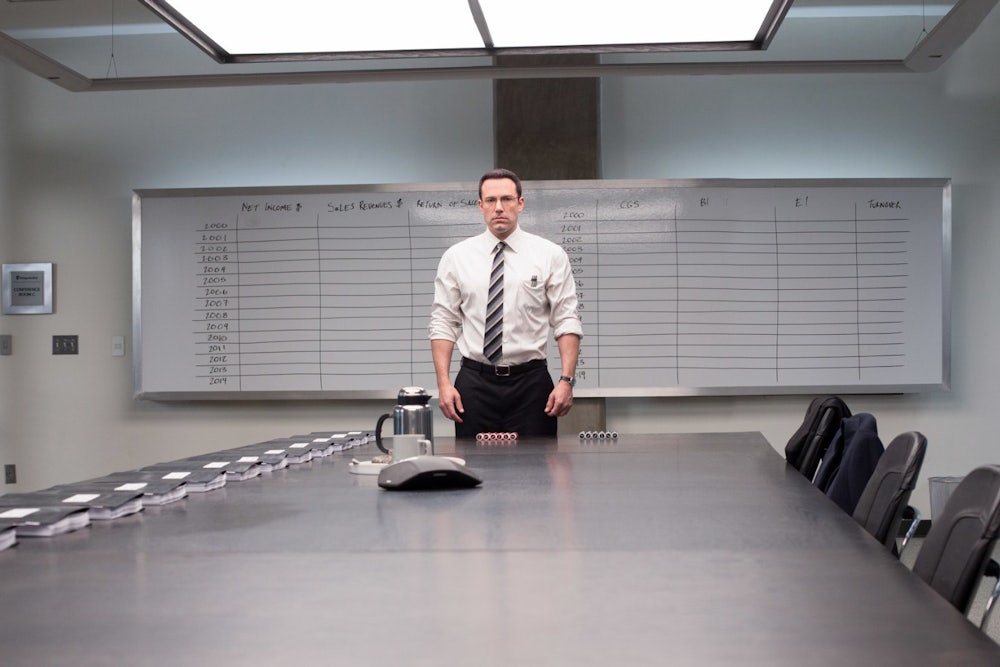The Accountant is the kind of film that hardly exists in the studio system anymore: Ostensibly for adults, the R-rated, plot-heavy thriller concerns serious themes involving serious people—it is not connected to a comic book, vampire novels, or a video game. When a movie like this somehow escapes the Hollywood boardroom, you can’t help but cheer, something original! Alas, when you realize The Accountant is a disjoined, confused, muddled mess, it sticks in one’s craw. This is why we can’t have nice things.
The Accountant follows Christian Wolff, a mild-minded accountant in suburban Chicago, who will turn out to be much more than meets the eye—he is played by Ben Affleck, after all. As it turns out, Christian runs the books for the world’s most hated dictators. He is also a skilled assassin, a collector of fine art and, oh yes, he has “high functioning autism.” (He also has plenty of time to work out: Christian is one jacked accountant.) A robotics company, seemingly unaware of his many talents, hires Christian to uncook its books, but when he and a plucky associate (Anna Kendrick) discover something they weren’t supposed to, they become the target of assassins. Christian has to figure out who’s trying to kill him, solve an ongoing family mystery, stay a step ahead of the feds, and make sure that his fork and knife are in the exact same spot while he’s eating. Office jobs can be exhausting.
Director Gavin O’Connor is a muscular, occasionally stirring filmmaker (Warrior, Miracle), specializing in mixing in the emotional with the brutal, but The Accountant’s messy conceit gets away from him quickly. (It’s the sort of film in which Jeffrey Tambor and John Lithgow show up for one scene, disappear for about 70 minutes, and then show up again, suddenly integral to the whole plot.) Everybody gets a long-winded backstory that stretches credibility, and the movie just piles on twist after twist until it has completely lost the thread.
At the heart of this nonsense is Christian, who is a nonsense character. After his mother leaves, his military father decides to turn his children into ruthless killers to make sure they aren’t picked on—what other option is there for a doting father? Christian blossoms into an obsessive-compulsive mathematician with countless aliases who runs from place to place, helping out dictators, aiding kindly farmers with their taxes, killing with dead-on aim of a sniper, falling in love, and keeping one eye on his fine art collection. He’s an accumulation of tics straining inside an Oxford button-down. (The film’s portrayal of autism is also oddly flippant, and it tries to turn into something uplifting in the final minutes, unconvincingly.) Affleck isn’t a bad actor necessarily; he’s smarter than he lets on, and at his best, he uses his inexpressiveness and lunkiness to his advantage. But even if you are playing an impassive character, you have to give us something beneath the surface, and Affleck is not an actor who is skilled at conveying a particularly complex inner life. Christian remains slack and dull—until, of course, the movie needs him to start kicking ass.
Nearly a dozen threads unravel in the last half hour; a scrambling, fevered multi-car pileup of plot. Christian helpfully turns into a combination of Batman and John Wick when the movie needs him to. It is possible I’m missing the point by complaining that Hollywood doesn’t make serious adult thrillers anymore. The problem is not that they choose to only make comic book movies, but rather its the only thing they know how to do anymore. The Accountant should be a straight-ahead thriller, but the film keeps tripping over its own incompetent feet. Maybe it was made for adults, but it sure doesn’t feel like it was made by them.
Grade: C
Grierson & Leitch write about the movies regularly for the New Republic and host a podcast on film. Follow them on Twitter @griersonleitch or visit their site griersonleitch.com.
